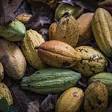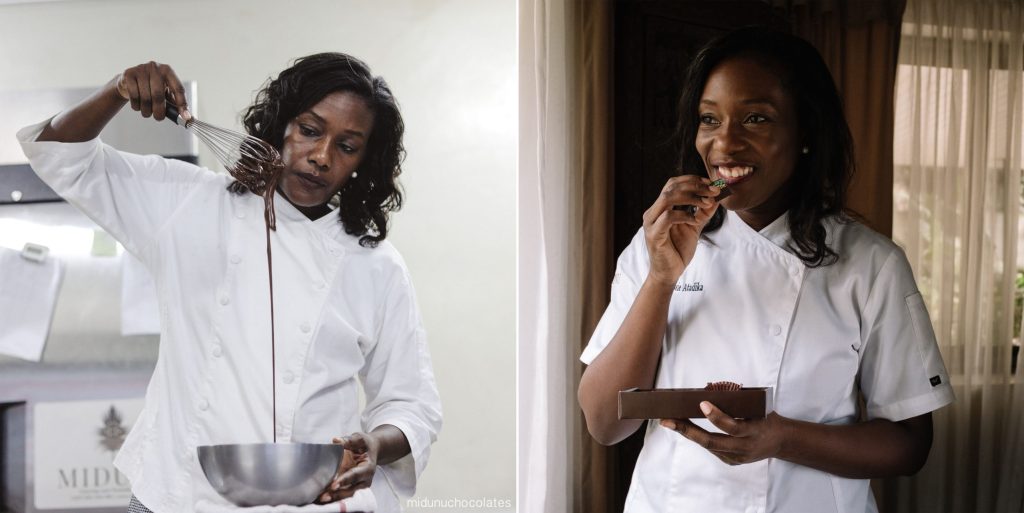MIDUNU CHOCOLATES’ BOLD TRUFFLES EMPOWER GHANAIAN TRADITIONS
There is nothing timid about Midunu Chocolates. From their array of bold flavor profiles to their mission to empower African economies, this 100% Ghanaian chocolate company is a dynamic force with detailed execution. Each truffle—handcrafted by a small team of women in Ghana—infuses local herbs, teas and spices from the continent. Some of these infusions are expected, like floral South African rooibos tea or Kenyan coffee. Others, however, are audacious. For instance: lemongrass-infused white chocolate or Cape Malay curry truffles—savory flavors that pair surprisingly well with sweeter notes. These daring combinations, the brainchild of founder Selassie Atadika, were crafted as way to journey through Africa. In fact, the company’s name is itself an invitation to explore. “Midunu” translates to “let’s eat” in Ewe (Atadika’s mother tongue) reflecting her greater desire to share the beauty of her culture.

Spices and chili with chocolate might take some people aback, but these flavors are part of Midunu’s charm. Not only do the chocolates attest to Atadika’s culinary expertise, but they also play a larger role in her ethos to uplift her heritage. “When we were growing up in New York,” she tells us, “my mother used to have friends over. One day, my brother asked her, ‘Why don’t you ever make Ghanaian food?’ And my mom said, ‘I don’t know if they’d be comfortable.’ My mom didn’t feel comfortable having guests over to eat with their hands. So there needs to be a space where we can all be who we are without having to hide.” In making chocolates infused with impactful spices, Atadika proudly puts African cuisine at the forefront, upending the conventions of chocolate-making while she’s at it. “I’m done playing it safe,” she says.

Founded in 2014, the company began as a culmination of Atadika’s work with the United Nations. With the United Nations, she traveled to 43 different countries, observing how food plays an integral role in society’s bedrock. She tells us, “I got to experience the flavors, recipes and food ways of these different countries, and I was very much like, ‘How can I share this with Ghanaians and other Africans who have not been able to travel as widely as I have?’” The answer was in chocolate.

“I felt it was really unique because people know chocolate,” Atadika continues. “Savory and regular cuisine can be overwhelming for people. So the idea was: how can I take something people know and something people don’t know and bring them together in a space that allows for a conversation?” As a globally loved dessert, chocolate became the perfect mediator between cultures. For some, these cuisine-bending truffles act as an entry point to learning more about Africa. For Africans who grew up with these spices, Midunu allows them to see their food in new ways. “With the issue of colonialism and extraction, there’s this feeling that cocoa beans are a commodity, not a fine product. I think that it is a fine product. The way we’re demonstrating how it can be a high-quality product coming from an African country changes that narrative. I love being able to give that dignity back to us. I try as much as possible to make sure that I tell the stories behind the ingredients.”

Telling a West African tale begins with the main ingredient: cocoa beans. Sourced from cocoa farmers in Ghana, these beans carry the distinct chocolatey notes exclusive to the terroir of the country. An additional West African taste stems from the beans’ fermentation process, which follows a Ghanaian tradition relying on plantain leaves. During this seven-day fermentation, the beans are sandwiched between the leaves, the sugar in the fruit is drawn out and the natural bacterias are broken down until the beans dry under the sun. At this point, Atadika and her team of women chocolatiers purchase the couverture from a licensed buying company (because cocoa beans are centralized through the Ghanaian government), where they add their adventurous infusions.

For Atadika, working with an all-woman team is an essential part of production, because it helps create new, sustainable livelihoods for women and the traditions they used to partake in. “For example, for dawadawa [a fermented locust bean seasoning] to have survived the test of time, the women fermenting it and their communities need to have ways in which these products are being used in modern ways with exposure to new economies,” Atadika explains. “The more people who eat dawadawa that’s coming from Northern Ghana, the more these livelihoods go on. One of the things I’ve realized in a lot of my trips around Ghana and parts of the continent is that these traditions are being lost. For example, Maggi Cubes [bouillon cubes] have flooded the market. So a lot of people are using some of those products and the traditional ferments are losing popularity. A lot of young women in the communities don’t want to learn the trade. This is how we support that.” It’s also why their next line of truffles includes dowadowa, sourced from a slow food community of women.

Amplifying women is also reflected in the chocolate’s packaging. Each iteration of chocolate is named after powerful women in Atadika’s life, known either personally or from stories. The Adowa—a dark chocolate truffle filled with a milk chocolate ganache, infused with five West African spices—is also the name given to girls born on Monday in Ghana like the founder’s mother.

Cultural references like these suffuse the truffles’ aesthetic as well. Glancing at the six-piece truffle box, one can’t help but notice the vibrant selection of colors and patterns on display. These ornamentations are designed by Atadika, who based each pattern on textiles and motifs from the region. After an ingredient has been chosen as a flavor, the chef reflects on what country or context inspired the choice. Then she selects a textile from that locale. Take, for instance, the truffle Nandi which relies on a liquor from South Africa. Its accompanying design features the pattern of the South African textile shweshwe, a fabric initially used during Apartheid to designate Black workers, but over the years has since been reclaimed by Black South Africans. Visually and sensorially, Nandi captures this story of ownership. “The names are there; the designs are there—all allow you to learn a bit more about the continent in a way that is digestible,” she elaborates.
Going forward, the founder hopes to grow the company to be fully bean to bar, a tricky feat given the legislative complications in Ghana’s centralized cocoa farming industry. Still, Atadika aspires to continue sharing her culture and fostering her community’s market. “I would love to see it growing out beyond the US into other international markets, just to be able to share that education and so those traditions can stand the test of time,” she tells us. Despite its dedication to honoring tradition, Midunu reinvents chocolates for the future of Africa.
All images courtesy of Midunu Chocolates
Source: coolhunting.com










More Stories
COTE D’IVOIRE WANTS TO CAPTURE GREATER SHARE OF COCOA VALUE CHAIN
INTERNATIONAL CHOCOLATE PRODUCERS SHOWCASE SOCIAL AND ECONOMIC SUSTAINABILITY
GHANA-BASED NICHE COCOA TO OPEN FIRST NORTH AMERICAN LOCATION IN FRANKLIN